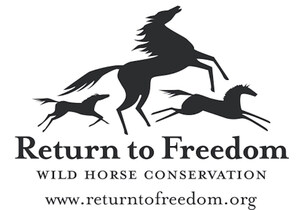Return to Freedom: Congress must press BLM for change in response to wild horse deaths
LOMPOC, Calif., April 29, 2022 /PRNewswire/ -- The Bureau of Land Management announced on Thursday that 95 federally protected wild horses died over the previous five days from a respiratory disease likely caused by an equine influenza virus. The deaths have occurred in corrals at the Colorado Department of Corrections in Cañon City, where the Bureau of Land Management is warehousing 2,550 wild horses.
In response, Return to Freedom Wild Horse Conservation (RTF), a national nonprofit advocacy organization, is calling for Congress to demand improved care and biosecurity for captured wild horses and burros – and for a long-overdue shift away from the mismanagement putting thousands of federally protected wild horses and burros into overcrowded off-range holding facilities.
"After enduring the trauma of their forced capture and removal from their home ranges in helicopter roundups, being separated from their family bands, then transported in trailers to confinement in government facilities, these once wild and free wild horses and burros are scared, stressed and more vulnerable to illness," RTF President Neda DeMayo said. "Failing to make the needed changes that will stop more wild horses and burros from ending up in overcrowded conditions is negligent and inexcusable."
Congress has called for wild horses and burros to be relocated to lower-cost and more natural pastures. As of February, the BLM was warehousing 21,784 wild horses and burros in large corral facilities like Cañon City at a daily cost to taxpayers of $6.19 per horse, however.
By comparison, it costs taxpayers $2.17 per horse, per day, to care for an additional 38,827 wild horses on leased or government pastureland.
RTF is urging lawmakers to hold the agency and its contractors accountable not just for maintaining best practices for the humane handling, care and biosecurity for wild horses and burros, but for routinely revising those protocols and increasing transparency.
"Congress must demand that the bar for standard of care for federally protected wild horses is not only met but raised ever-higher," DeMayo said. "Taxpayers who have invested so much into our public lands and the protection of wild horses and burros expect nothing less."
Concerns about off-range holding are magnified by the BLM's plans to remove a record 19,000 wild horses and burros from their home ranges this year. The agency intends to only treat only 2,300 wild horses with proven, safe and humane fertility control over the same period.
RTF has long advocated for the use of a readily available fertility control vaccine that if properly implemented can replace removals as the agency's primary management tool and allow for the phasing out of long-term holding.
In recent years, Congress has provided increased funding for fertility control – "BLM has valuable tools at its disposal today to control wild horse and burro populations humanely," wrote the Senate Interior Appropriations Committee last year – but the agency has put little to that use.
Instead, the BLM continues chasing its own arbitrary population targets from Herd Management Area to Herd Management Area, decimating wild herds, then soon returning with helicopters to put more wild horses and burros into off-range holding.
It is clear that if Congress does not hold BLM's feet to the fire, the cycle of capture, removal and costly warehousing of wild horses and burros will continue as it has for decades.
"The deaths of dozens of wild horses in Cañon City must be investigated and steps taken to improve the safety and well-being of wild horses and burros, but that is not enough," DeMayo said. "Congress can and must reduce the chances of further tragedy by pushing the BLM away from the endless cycle of capture-removal-warehousing that has failed America's wild herds and taxpayers alike."
Return to Freedom Wild Horse Conservation (RTF) is a national nonprofit organization dedicated to wild horse preservation through sanctuary, education, conservation, and advocacy since 1998. It also operates the American Wild Horse Sanctuary at three California locations, caring for more than 450 wild horses and burros. Follow us on Facebook, Twitter, and Instagram for updates about wild horses and burros on the range and at our sanctuary.
SOURCE Return to Freedom Wild Horse Conservation

WANT YOUR COMPANY'S NEWS FEATURED ON PRNEWSWIRE.COM?
Newsrooms &
Influencers
Digital Media
Outlets
Journalists
Opted In




Share this article